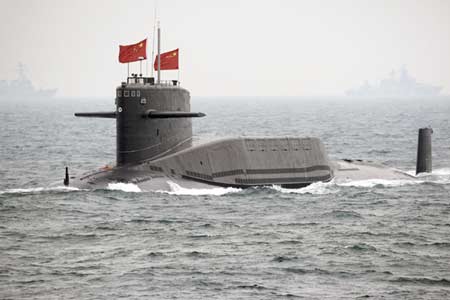On Thursday, Chairman Peter King of New York will convene in his House Homeland Security Committee one of the most anticipated – and controversial – hearings in memory. The subject? “The Extent of Radicalization in the American Muslim Community and that Community’s Response.” It is hard to imagine a more timely, and more urgently needed, inquiry.
For one thing, events in the Middle East have thrust to the forefront concerns about the Muslim Brotherhood (MB or, in Arabic, Ikhwan). That organization was established in Egypt in 1928 and it is likely to become the dominant political force there in the wake of the overthrow of the MB’s long-time nemesis, former President Hosni Mubarak.
For another, confusion about the true nature and intentions of the Muslim Brotherhood is much in evidence at the moment. The Director of National Intelligence, James Clapper, contributed to it, first by testifying last month that the Brotherhood is “a largely secular organization.” He subsequently recanted that preposterous characteri zation, but nonetheless downplayed concerns about the group by insisting that it is “heterogeneous,” has “eschewed violence” and is engaged in good works, like hospitals and day care.

Such contentions are, presumably, contributing to the Obama administration’s intention – as reported on the front page of the Washington Post last Friday – to establish relations with Muslim Brotherhood-dominated or other Islamist governments emerging from the revolutions sweeping the Middle East. The implications of that decision would be incalculably problematic for our homeland security, as well as our foreign policy interests.
For these among other reasons, Congressman King’s hearings provide an invaluable opportunity to examine not just the threat of “extremism” posed by al Qaeda, but also that arising from the Muslim Brotherhood’s operations at home and abroad. Absent the latter, it will be impossible to understand either the source of much of what has been dubbed “extremism” in the Muslim-American community, or the reason that community has been so deficient in systematically, comprehensively and consistently helpfully responding to extremists in its midst.
In point of fact, as a book published last November by the Center for Security Policy – Shariah: The Threat to America – makes clear, the Muslim Brotherhood is not just somebody else’s problem; its ours. It operates in some seventy countries worldwide, including the United States. In each, it adapts its methods to suit the local conditions. Where practicable, the MB uses violence to achieve its goals; where not, its uses stealth.
But the Ikhwan‘s goals are the same in every case. Indeed, they are the same as those embraced by Islamists everywhere, including al Qaeda: By definition, they are dedicated to the global triumph of shariah, a politico-military-legal program that is unalterably totalitarian and supremacist in character and wholly incompatible with this country’s Constitution.
If Congressman King and his colleagues want to get to the bottom of what is happening in the Muslim-American community at the moment, they must explore the extent to which virtually every prominent group that purports to speak for that community is a front for the Muslim Brotherhood or sympathetic to its agenda. This is not a matter of speculation; it has been established by the Department of Justice in federal court in connection with the Holy Land Foundation trial, largest terrorism financing prosecution in U.S. history.
Particularly dispositive is the Brotherhood’s strategic plan which the prosecution introduced into evidence uncontested in that trial. After declaring the mission of the Ikhwan in America to be “destroying the Western civilization from within…by their [that is, our] hands and the hands of the believers,” this document describes such groups as the Muslim Students Association, the Islamic Society of North America and the progenitor of the Council on American Islamic Relations, the Islamic Association of Palestine, as “our organizations and organizations of our friends.”
It should, therefore, be no surprise that such groups have been aggressively vilifying the chairman as a “racist” and “bigot,” assailing his choice of witnesses (including an authentic Muslim reformer, Dr. Zuhdi Jasser) and denouncing the whole hearing enterprise as an example of “Islamophobia” and McCarthyism.
Shakespeare’s cynical turn of phrase – “They doth protest too much” – comes to mind. This caviling is transparently aimed at preemptively discrediting and, if possible, aborting the King hearings. Clearly, the Brotherhood’s effort to wage stealth jihad inside the United States and, in particular, its successful penetration of the U.S. government, could be seriously imperiled if Rep. King and his colleagues do their jobs.
The rest of us, however, hope and expect that the Homeland Security Committee will not shrink from a close examination of the role being played in the American Muslim community by both al Qaeda and its ilk, and by the Muslim Brotherhood.
For example, of whom was Gen. Clapper speaking when he told ABC’s Diane Sawyer last December that he considered the “Muslim community to be a source of advice, counsel and wisdom” with respect to the extremists among them. Was he referring to the self-appointed “leadership” of that community – namely, the Muslim Brotherhood’s front groups?
If Thursday’s hearing takes the nation to school on the source of such extremism – shariah – and the role played in promoting it by the Muslim Brotherhood, as well as al Qaeda, every patriotic American, Muslim and non-Muslim alike, will owe Chairman King an enormous debt of gratitude.
COMMENTS
Please let us know if you're having issues with commenting.